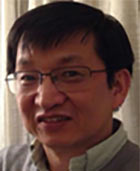SPS Webinar: Graph Fourier Transform for Directed Graphs
Date: 28 March 2025
Time: 2:00 PM ET (New York Time)
Presenter(s): Dr. Qiyu Sun
Based on the IEEE Xplore® article:
"SVD-Based Graph Fourier Transforms on Directed Product Graphs"
Published: IEEE Transactions on Signal and Information Processing over Networks, July 2023.
Download article: Original article is open access and publicly available for download.
Abstract
Graph Fourier transform (GFT) is one of the fundamental tools in graph signal processing to decompose graph signals into different frequency components and effectively represent graph signals with strong correlations using various modes of variation. The GFT on undirected graphs has been well-studied, with a conventional approach based on the eigen decomposition of the graph Laplacian. However, this method does not apply to directed graph settings. Several approaches have been proposed to define GFTs on directed graphs, including Jordan decomposition of the graph Laplacian, eigen decomposition of the magnetic Laplacian, and their variants.
In this webinar, the presenter will primarily discuss GFT based on the singular value decompositions of graph shifts. The proposed GFT efficiently represents datasets on directed graphs with strong correlations, and in the corresponding frequency domain, the band limiting procedure provides a good approximation for smooth signals.
Biography

Qiyu Sun received the B.Sc. and Ph.D. degrees in mathematics from Zhejiang University, Hangzhou, Zhejiang, China, in 1985 and 1990, respectively.
He is currently a Professor of Mathematics at the University of Central Florida, Orlando, FL, USA. He previously held positions at Zhejiang University, China; the National University of Singapore, Singapore; Vanderbilt University, Nashville, TN; and the University of Houston, Houston, TX. His research interests include applied and computational harmonic analysis, mathematical signal processing, control and optimization, and sampling theory.
Dr. Sun has published more than 130 papers and was the recipient of the 2019 SIAG/CST Best SICON Paper Prize.













